Anpassungsfähigkeit und Resilienz des Finanzsystems
Diese Forschungsgruppe untersucht kritische Aspekte der Anpassungsfähigkeit und Widerstandsfähigkeit von Finanzsystemen. Sie analysiert die Auswirkungen von Naturkatastrophen auf Finanzsysteme, die Auswirkungen politischer Präferenzen für die grüne Transformation und die Bedeutung von Kultur in den Volkswirtschaften.
Forschungscluster
Finanzresilienz und RegulierungIhr Kontakt

- Abteilung Finanzmärkte
PROJEKTE
08.2022 ‐ 07.2025
OVERHANG: Schuldenüberhang und grüne Investitionen – die Rolle von Banken für den klimafreundlichen Umgang mit emissionsintensiven Anlagenvermögen
Bundesministerium für Bildung und Forschung (BMBF)
Ziel von OVERHANG ist es, die Rolle von Banken für den klimafreundlichen Umgang mit emissionsintensiven Anlagevermögen zu untersuchen. Hierdurch sollen politikrelevante Erkenntnisse zu Finanzregulierung, staatlich kontrollierter Kreditvergabe und Finanzstabilität identifiziert sowie eine Sensibilisierung der verschuldeten Akteurinnen und Akteuren erreicht werden.
Das Projekt wird vom Bundesministerium für Bildung und Forschung (BMBF) finanziert.
01.2015 ‐ 12.2019
Interactions between Bank-specific Risk and Macroeconomic Performance
Deutsche Forschungsgemeinschaft (DFG)
07.2016 ‐ 12.2018
Relationship Lenders and Unorthodox Monetary Policy: Investment, Employment, and Resource Reallocation Effects
Leibniz-Gemeinschaft
We combine a number of unique and proprietary data sources to measure the impact of relationship lenders and unconventional monetary policy during and after the European sovereign debt crisis on the real economy. Establishing systematic links between different research data centers (Forschungsdatenzentren, FDZ) and central banks with detailed micro-level information on both financial and real activity is the stand-alone proposition of our proposal. The main objective is to permit the identification of causal effects, or their absence, regarding which policies were conducive to mitigate financial shocks and stimulate real economic activities, such as employment, investment, or the closure of plants.
Referierte Publikationen
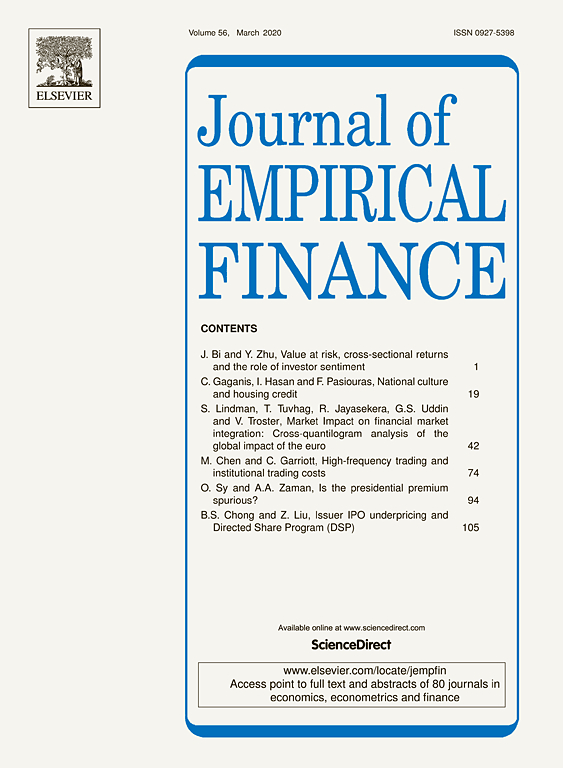
National Culture and Housing Credit
in: Journal of Empirical Finance, March 2020
Abstract
Using a sample of around 30 countries over the period 2001–2015, this study provides evidence that deeply rooted cultural differences are significantly associated with the use of mortgage debt. More detailed, we find that power distance and uncertainty avoidance have a negative impact on the value of the total outstanding residential loans to GDP. This finding is robust across various specifications and the use of alternative measures of mortgage debt. In contrast, trust has a positive and robust impact on all the measures of mortgage debt. Other dimensions of national culture like long-term orientation, individualism, and indulgence, also appear to matter; however, their impact depends on the control variables and the employed measure of mortgage debt.
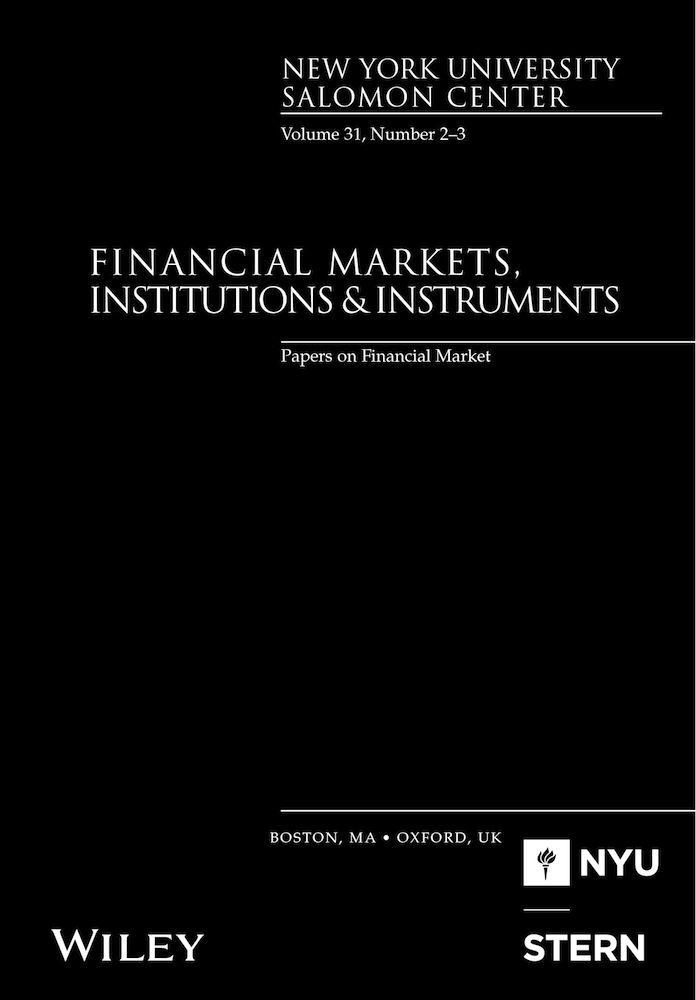
Motivating High‐impact Innovation: Evidence from Managerial Compensation Contracts
in: Financial Markets, Institutions and Instruments, Nr. 3, 2019
Abstract
We investigate the relationship between Chief Executive Officer (CEO) compensation and firm innovation and find that long‐term incentives in the form of options, especially unvested options, and protection from managerial termination in the form of golden parachutes are positively related to corporate innovation, and particularly to high‐impact, exploratory (new knowledge creation) invention. Conversely, non‐equity pay has a detrimental effect on the input, output and impact of innovation. Tests using the passage of an option expensing regulation (FAS 123R) as an exogenous shock to option compensation suggest a causal interpretation for the link between long‐term pay incentives, patents and citations. Furthermore, we find that the decline in option pay following the implementation of FAS 123R has led to a significant reduction in exploratory innovation and therefore had a detrimental effect on innovation output. Overall, our findings support the idea that compensation contracts that protect from early project failure and incentivize long‐term commitment are more suitable for inducing high‐impact corporate innovation.

Lock‐in Effects in Relationship Lending: Evidence from DIP Loans
in: Journal of Money, Credit and Banking, Nr. 4, 2019
Abstract
Do prior lending relationships result in pass‐through savings (lower interest rates) for borrowers, or do they lock in higher costs for borrowers? Theoretical models suggest that when borrowers experience greater information asymmetry, higher switching costs, and limited access to capital markets, they become locked into higher costs from their existing lenders. Firms in Chapter 11 seeking debtor‐in‐possession (DIP) financing often fit this profile. We investigate the presence of lock‐in effects using a sample of 348 DIP loans. We account for endogeneity using the instrument variable (IV) approach and the Heckman selection model and find consistent evidence that prior lending relationship is associated with higher interest costs and the effect is more severe for stronger existing relationships. Our study provides direct evidence that prior lending relationships do create a lock‐in effect under certain circumstances, such as DIP financing.

Badly Hurt? Natural Disasters and Direct Firm Effects
in: Finance Research Letters, 2019
Abstract
We investigate firm outcomes after a major flood in Germany in 2013. We robustly find that firms located in the disaster regions have significantly higher turnover, lower leverage, and higher cash in the period after 2013. We provide evidence that the effects stem from firms that already experienced a similar major disaster in 2002. Overall, our results document a positive net effect on firm performance in the direct aftermath of a natural disaster.
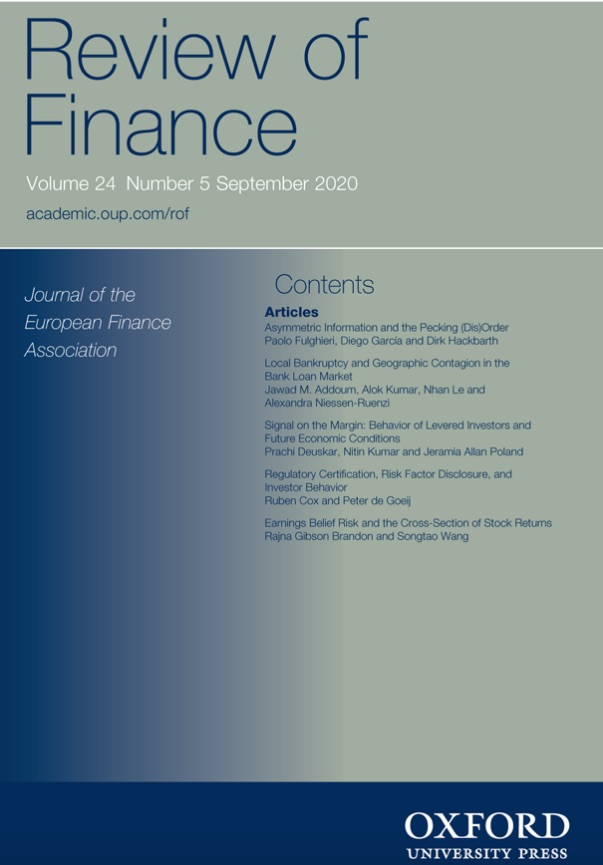
How Do Banks React to Catastrophic Events? Evidence from Hurricane Katrina
in: Review of Finance, Nr. 1, 2019
Abstract
This paper explores how banks react to an exogenous shock caused by Hurricane Katrina in 2005, and how the structure of the banking system affects economic development following the shock. Independent banks based in the disaster areas increase their risk-based capital ratios after the hurricane, while those that are part of a bank holding company on average do not. The effect on independent banks mainly comes from the subgroup of highly capitalized banks. These independent and highly capitalized banks increase their holdings in government securities and reduce their total loan exposures to non-financial firms, while also increasing new lending to these firms. With regard to local economic development, affected counties with a relatively large share of independent banks and relatively high average bank capital ratios show higher economic growth than other affected counties following the catastrophic event.
Arbeitspapiere
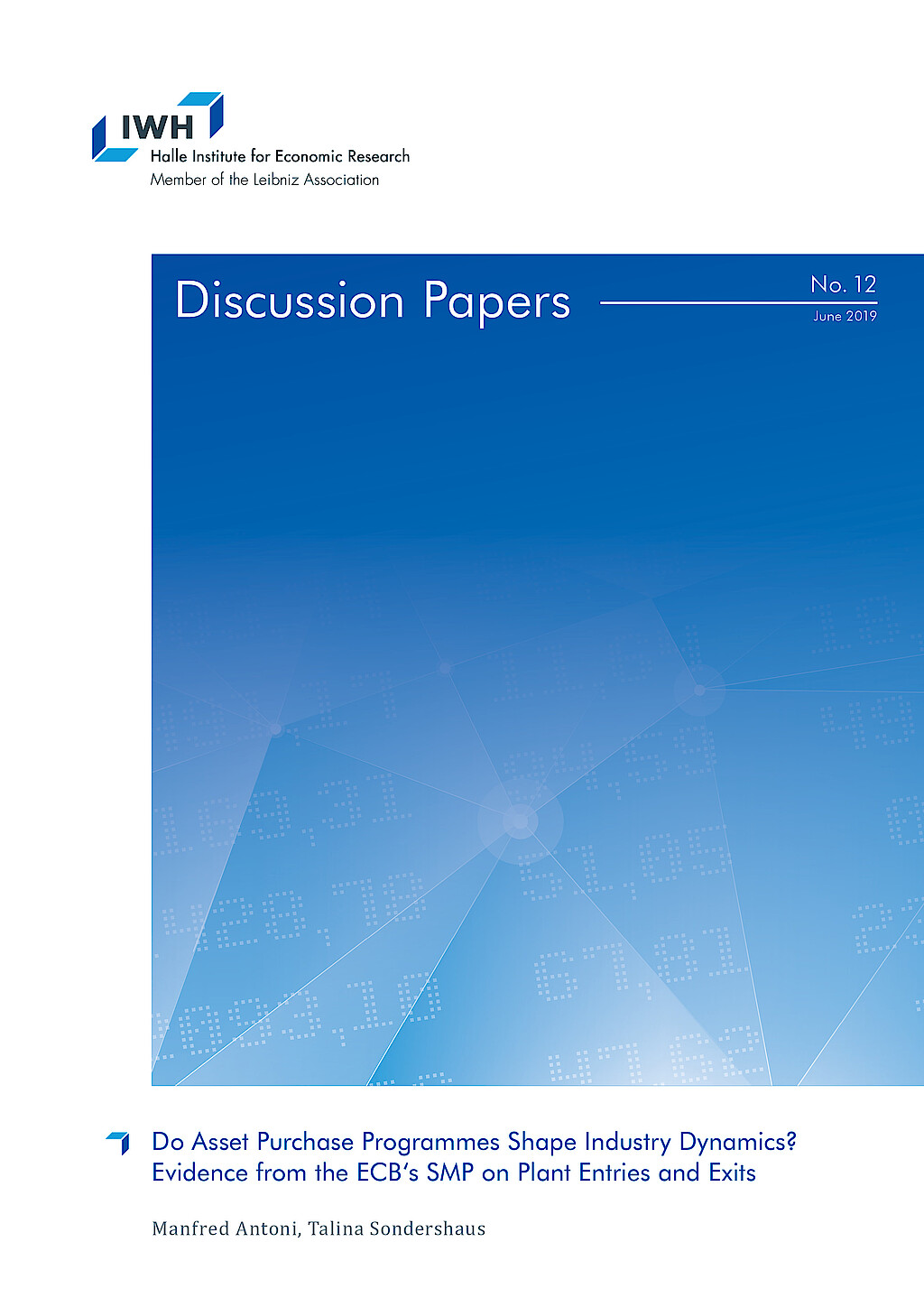
Do Asset Purchase Programmes Shape Industry Dynamics? Evidence from the ECB's SMP on Plant Entries and Exits
in: IWH Discussion Papers, Nr. 12, 2019
Abstract
Asset purchase programmes (APPs) may insulate banks from having to terminate relationships with unproductive customers. Using administrative plant and bank data, we test whether APPs impinge on industry dynamics in terms of plant entry and exit. Plants in Germany connected to banks with access to an APP are approximately 20% less likely to exit. In particular, unproductive plants connected to weak banks with APP access are less likely to close. Aggregate entry and exit rates in regional markets with high APP exposures are also lower. Thus, APPs seem to subdue Schumpeterian cleansing mechanisms, which may hamper factor reallocation and aggregate productivity growth.

‘And Forgive Us Our Debts’: Do Christian Moralities Influence Over-indebtedness of Individuals?
in: IWH Discussion Papers, Nr. 8, 2019
Abstract
This paper analyses whether Christian moralities and rules formed differently by Catholics and Protestants impact the likelihood of households to become overindebted. We find that over-indebtedness is lower in regions in which Catholics outweigh Protestants, indicating that Catholics‘ forgiveness culture and a stricter enforcement of rules by Protestants serve as explanations for our results. Our results provide evidence that religion affects the financial situations of individuals and show that even 500 years after the split between Catholics and Protestants, the differences in the mind-sets of both denominations play an important role for situations of severe financial conditions.
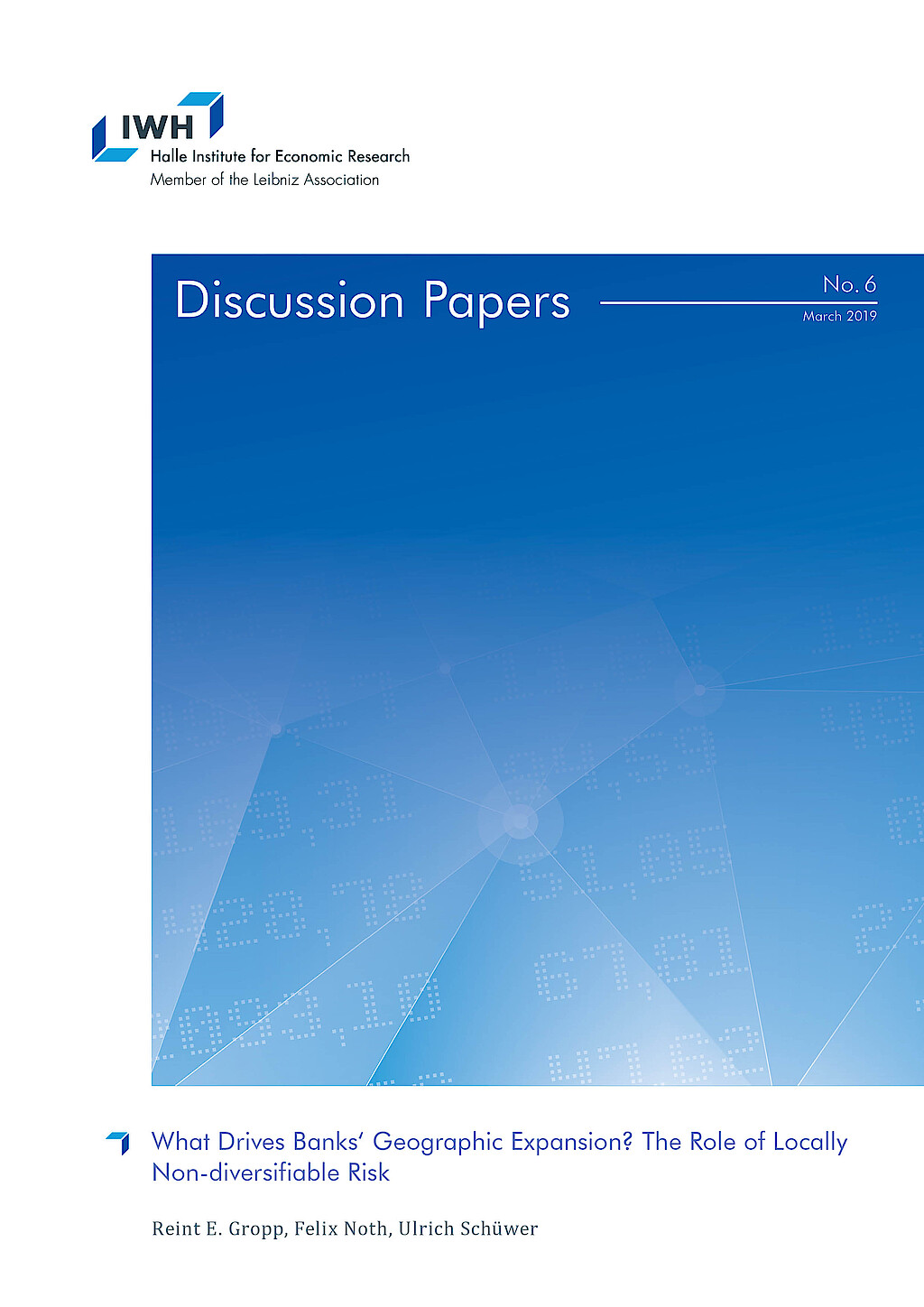
What Drives Banks‘ Geographic Expansion? The Role of Locally Non-diversifiable Risk
in: IWH Discussion Papers, Nr. 6, 2019
Abstract
We show that banks that are facing relatively high locally non-diversifiable risks in their home region expand more across states than banks that do not face such risks following branching deregulation in the 1990s and 2000s. These banks with high locally non-diversifiable risks also benefit relatively more from deregulation in terms of higher bank stability. Further, these banks expand more into counties where risks are relatively high and positively correlated with risks in their home region, suggesting that they do not only diversify but also build on their expertise in local risks when they expand into new regions.

Politics, Banks, and Sub-sovereign Debt: Unholy Trinity or Divine Coincidence?
in: Deutsche Bundesbank Discussion Paper, Nr. 53, 2018
Abstract
We exploit election-driven turnover in State and local governments in Germany to study how banks adjust their securities portfolios in response to the loss of political connections. We find that local savings banks, which are owned by their host county and supervised by local politicians, increase significantly their holdings of home-State sovereign bonds when the local government and the State government are dominated by different political parties. Banks' holdings of other securities, like federal bonds, bonds issued by other States, or stocks, are not affected by election outcomes. We argue that banks use sub-sovereign bond purchases to gain access to politically distant government authorities.
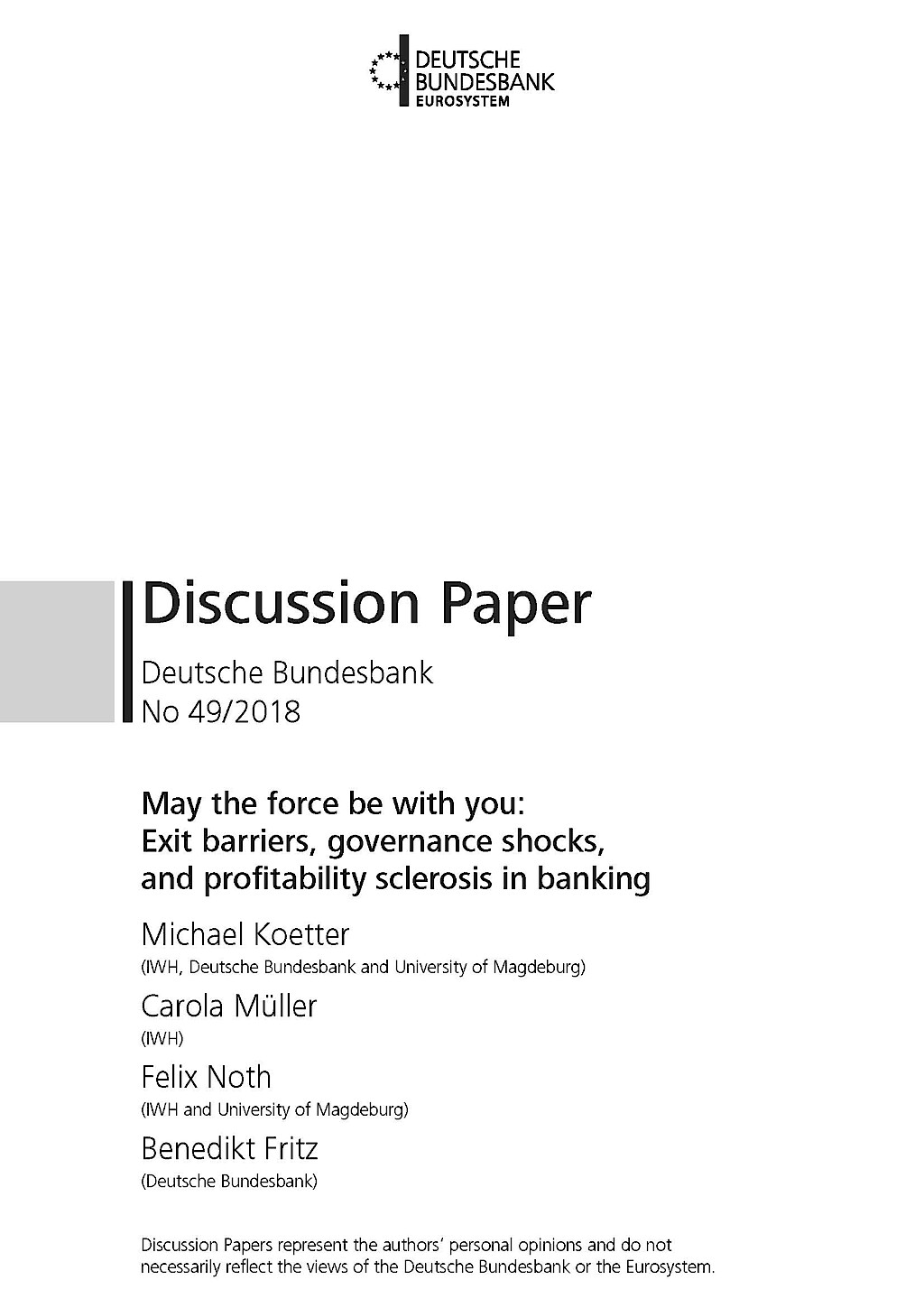
May the Force Be with You: Exit Barriers, Governance Shocks, and Profitability Sclerosis in Banking
in: Deutsche Bundesbank Discussion Paper, Nr. 49, 2018
Abstract
We test whether limited market discipline imposes exit barriers and poor profitability in banking. We exploit an exogenous shock to the governance of government-owned banks: the unification of counties. County mergers lead to enforced government-owned bank mergers. We compare forced to voluntary bank exits and show that the former cause better bank profitability and efficiency at the expense of riskier financial profiles. Regarding real effects, firms exposed to forced bank mergers borrow more at lower cost, increase investment, and exhibit higher employment. Thus, reduced exit frictions in banking seem to unleash the economic potential of both banks and firms.



















